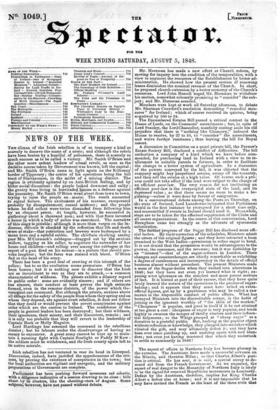Parliament has been pushing forward measures sub sikntio, with a
diligence indicative of a session drawing to its close : bills shoot by in clusters, like the shooting-stars of August. Some subjects, however, have not passed without debate.
Mr. Horsman has made a new effort at Church reform? by moving for inquiry into the condition of the temporalities, with a view to augment the resources of the Establishment by better ad- ministration. He showed how the present system of renewing leases diminishes the nominal revenue of the Church. In short, he proposed church-extension by a better economy of the Church's resources. Lord John Russell urged Mr. Horsman to withdraw his motion, somewhat solemnly promising to "consider" the sub- ject; and Mr. Horsman acceded. -
Members were kept at work all Saturday afternoon, to debate Mr. Sharman Crawford's resolution demanding "remedial mea- sures" for Ireland ; which of course received its quietus, being negatived by 100 to 24. The Encumbered Estates Bill passed a critical contest in the House of Lords, on the Commons' amendments ; but, in spite of Lord Stanley, the LordChancellor; manfully casting aside his old prejudice that there is "nothing like Chancery," induced the House to resolve, by 27 to 10, to "consider" the amendments, and waive further resistance ; thus leaving the bill for Royal assent.
A discussion in Committee on a quasi private bill, the Farmer's Estate Society Bill, disclosed a conflict of difficulties. The bill authorizes a company of a kind which we have before com- mended, for purchasing land in Ireland with a view to its re- 'allotment in suitable parcels to farmers, in order to facilitate the change to a better system of agriculture. In a discussion of the powers conveyed by the hill, it was objected that the company might buy pauperized estates, sweep off the tenantry, and then sell the estates at a high value. Of course such a pro- cess could not-take effect if the land were subject to the charge of an "effibient poor-law. The very reason for not instituting an efficient poor-law is-the overpeopled state of the land, and its depressed value ; so, that there seems no room to make a be- gimung—unless it were done by favour of emigration. In a conversational debate among the Peers on Thursday, on the state of Ireland, Lord Lansdowne intimated that Parliament Would in the first instance be prorogued for a short time only, and reassembled if events in Ireland should need it. Meanwhile, steps are to be taken for the effectual suppression of the Clubs and all secret organizationi:, In the course of this conversation, Lord Brougham came 'but strongly as the advocate of systematic colonization. , The further progress of the Sugar Bill disclosed more offi- cial 'aches. By theireorrertiou ofthe schedules, Ministers admit the errors of the original figures ; and they have retracted a boon promised to the West Indies—perniission to refine sugar in bond. It is not denied that the permission would be advantageous to the grower, the consumer, and the revenue ; but,it was forbidden by an " interest "—that of the sugar-refiners in London. These changes and counterchanges are chiefly remarkable as exhibiting a degree of carelessness and incompetency in the details of official business almost without precedent. The present Ministers made a mess of, the Sugar-duties when they rushed into alterations in 1846; but they have not even yet learned what is right; ex- posing utter ie-norance on the simplest and most patent matters of fact. It is hinted as part of their excuse, that they have quite' lately learned the nature of the operations in the process of sugar- baking; and it appears that they must have relied on extra- official figures, got up by a gentleman who may be called a raw recruit in the responsible conduct of public affairs. What has betrayed Ministers into the discreditable scrape, is the habit of joining in the ignorant worship of " the idols of the market."
Cheapness" is popular, and good in itself if it be not attained at too great a cost : cheapness of sugar is very popUlar, and tends highly to sweeten the temper of thrifty electors and their influen- tial helpmates; so the Whigs grasped at "cheap sugar" as a donative to a grateful public. But, rushing at the popular object without reflection or knowledge, they plunged into mistakes which vitiated the gift, and may ultimately defeat it ; and they have been ever since patching up, and undoing again with new blun- ders; not even yet having mastered that which they undertook to settle so summarily in 1846 I


















